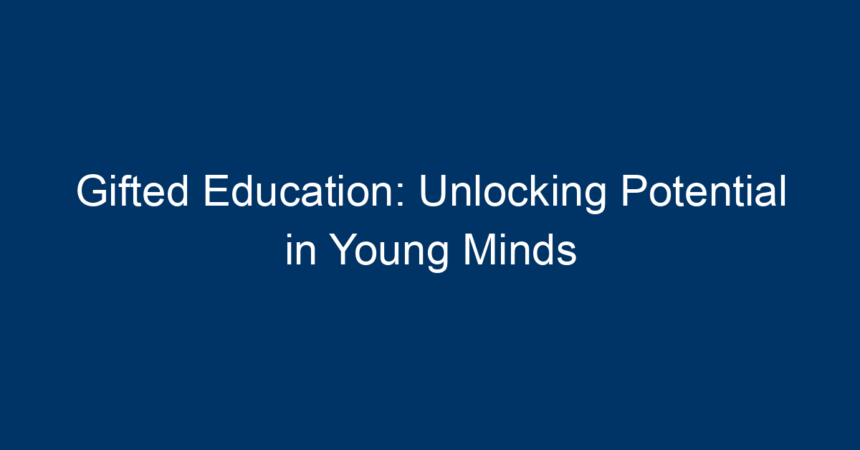In today’s rapidly evolving world, the pursuit of knowledge and creativity in children has never been more critical. Gifted education serves as a beacon for nurturing exceptional talents in young minds. While conventional educational systems tend to focus on standard curricula, gifted education recognizes the unique learning needs of intellectually advanced students. This article delves into the importance of gifted education, identifies its key components, and offers actionable insights for parents, educators, and stakeholders.
Understanding Gifted Education
Gifted education refers to specialized instructional practices tailored for students who demonstrate remarkable abilities or potential in one or more areas. These areas can vary significantly, encompassing intellectual acumen, artistic talent, leadership abilities, and creativity. The aim is to cultivate these capabilities through differentiated learning strategies designed to inspire and challenge gifted learners.
The Importance of Gifted Education
Gifted education is not merely an advantage—it’s a necessity for fostering a generation of creative thinkers and innovators. Here are several reasons why prioritizing gifted education is essential:
-
Recognizing Individual Needs: Gifted students often require different learning experiences to remain engaged and challenged. Traditional educational settings may not provide the pace or depth necessary for these students to thrive.
-
Enhancing Academic Achievement: Research shows that gifted education programs can significantly enhance academic performance. Students in these programs often achieve higher test scores and demonstrate superior problem-solving skills.
-
Fostering Emotional Development: Gifted education provides support for emotional and social challenges commonly faced by gifted individuals, such as feelings of isolation or intense perfectionism.
- Preparing Future Leaders: By nurturing exceptional talents, gifted education contributes to the development of future leaders who are equipped to tackle complex global challenges.
Identifying Giftedness
Understanding how to identify gifted students is crucial for implementing an effective education strategy. Giftedness can manifest in various ways, and identifying it may require a multifaceted approach. Here are some common indicators:
Cognitive Abilities
Gifted students often exhibit advanced reasoning skills, superior problem-solving capabilities, and a quick ability to grasp complex concepts. Standardized testing, though not the only method, plays a role in identifying these cognitive gifts.
Creative Expression
Creativity is as significant an indicator of giftedness as intellectual ability. Students displaying innovative ideas in art, music, or writing should be considered for gifted education programs.
Leadership Skills
Some gifted individuals exhibit exceptional leadership qualities. A propensity for influencing peers or a desire to take on roles of responsibility can signal talent.
Passionate Interests
Gifted learners often develop intense interests in specific subjects, whether it’s science, mathematics, literature, or the arts. These interests can provide insight into their potential areas of aptitude.
Components of Effective Gifted Education Programs
Implementing world-class gifted education programs involves several key components aimed at developing both academic skills and emotional intelligence:
Differentiated Instruction
Differentiated instruction is imperative in gifted education. Teachers tailor lessons to meet varied skill levels, allowing gifted students to progress at their own pace. This may involve compacting curriculum, offering advanced content, or providing opportunities for exploratory learning.
Enrichment Activities
Enrichment programs can significantly enhance the educational experience. Activities outside the traditional classroom—like debates, science fairs, or arts programs—allow gifted students to explore their interests more deeply and broaden their horizons.
Mentorship Opportunities
Setting up mentoring relationships with professionals can further stimulate gifted students. These mentors can guide them through their interests, providing valuable insights and fostering skills related to real-world applications of their talents.
Social-Emotional Learning
Addressing the emotional well-being of gifted students is fundamental. Gifted education should incorporate social-emotional learning frameworks to help students navigate the complexities of their unique experiences, build resilience, and develop strong interpersonal skills.
How Parents Can Support Gifted Education
Parents play a crucial role in enhancing their child’s gifted education experience. Here are some ways they can provide support:
Encourage Exploration
Encourage children to delve into their interests, whether academic, artistic, or athletic. Providing a variety of resources, from books to workshops, can help stimulate their passions.
Communicate with Educators
Establishing open lines of communication with teachers and administrators is essential. Parents should advocate for their child’s needs and be an active participant in discussing potential gifted education opportunities.
Build Emotional Resilience
Help your child develop emotional resilience by discussing challenges openly. Teaching coping strategies can empower them to handle the pressures associated with giftedness.
Seek Out Extracurricular Activities
Extracurricular activities can be an excellent way for gifted children to explore their interests in a less formal setting. Look for clubs, competitions, or community programs that align with their passions.
The Role of Educators in Gifted Education
Educators hold a pivotal position in implementing effective gifted education programs. Here are some strategies educators can employ:
Continuous Professional Development
Educators should pursue ongoing training in gifted education methodologies. This training enhances their ability to recognize giftedness and implement effective instructional approaches.
Collaborate with Parents
Building partnerships with parents can reinforce the efforts made within the classroom. This collaboration allows for a more holistic approach to supporting gifted students.
Create a Supportive Environment
Fostering a classroom culture that celebrates diversity in learning abilities is critical. Gifted students should feel valued and understood, not isolated or pressured to conform.
Assess and Adapt
Regular assessments can help educators adapt their teaching methods. Whether through formative assessments or academic competitions, understanding students’ needs is key to guiding their growth.
Challenges in Gifted Education
Despite the benefits, numerous challenges persist in the field of gifted education. Addressing these challenges is crucial for sustaining and enhancing gifted education programs.
Stigmas and Misunderstandings
Gifted students can face stigma, often being labeled as "know-it-alls" or socially awkward. Awareness and education about giftedness can help dismantle these misconceptions.
Resource Constraints
Many educational institutions face budgetary limitations that hinder the implementation of robust gifted education programs. Advocacy and funding are essential for overcoming these obstacles.
Overlooked Students
Often, students from diverse backgrounds may be overlooked when identifying giftedness. Efforts must be made to ensure inclusivity in gifted education programs and address potential biases.
Conclusion: Unlocking the Future Potential
Gifted education plays a vital role in shaping young minds for future challenges. By recognizing the unique learning needs of gifted students, we can empower them to realize their full potential. Parents and educators must work together to provide the necessary resources and emotional support, ensuring these exceptional children are not only challenged academically but also nurtured emotionally.
As stakeholders in gifted education, let’s prioritize awareness, advocate for resources, and celebrate the diversity of talents found in all children. Whether you are a parent, educator, or community member, your role in unlocking the potential in these young minds is invaluable. Together, we can foster an environment where gifted education thrives, paving the way for a brighter future.




